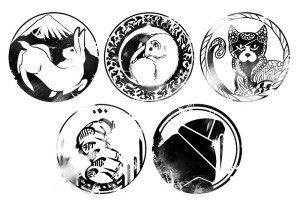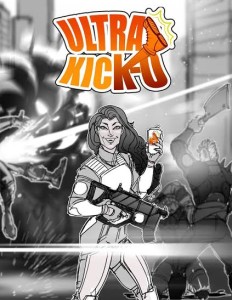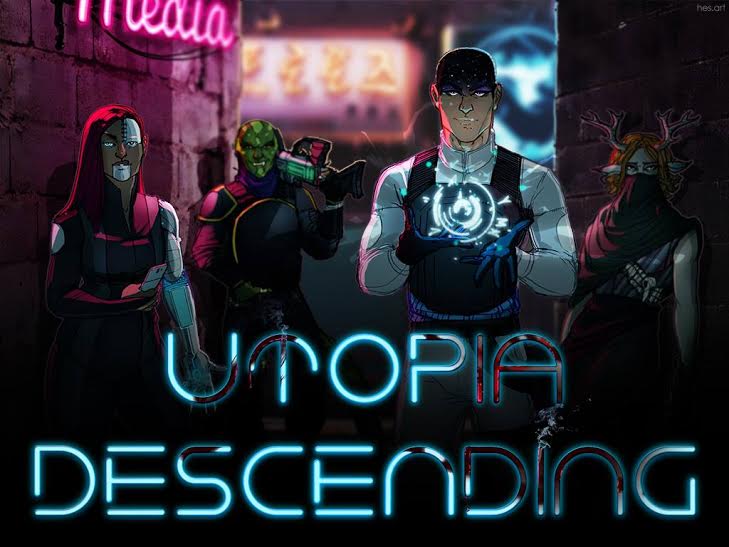Utopia Descending: LARP Meets ARG
Last summer I discovered a new addiction: LARPing. The upcoming game titled Utopia Descending is sure to feed my growing love of the game genre and hopefully spark a new hybrid genre combining elements of Live Action Role Play and Augmented Reality Games.
If you recall, last summer I participated in my local Dystopia Rising game and had a blast. Sadly my local game is no longer in operation, but with Utopia Descending on the horizon many of us local LARPers are excited to have another game to sink our teeth into. And yes, you are reading that right. Dystopia Rising and Utopia Descending‘s names are freakishly similar and there’s a good reason for it. The game comes from the same creators, but as the inverted name suggests, it’s going to be an entirely new beast. Not only will the atmosphere and game mechanics differ, but it’ll combine elements I’ve never seen blended together before to create a unique hybrid ARG/LARP game.
I had a chance to chat with Michael Pucci, founder and creator of the game, and Evan Tessier, the writer and co-creator, to find out what’s in store for us.
What inspired you to create a game that combines elements of LARP and ARGs?
Pucci: Without a doubt the potential for telling wider scope stories inspired me. I’ve worked on both ARG and LARP creation in the past and found that both carry a lot of the same elements when looking to create an immersive and entertaining story. Each of the two different mediums excel in a different way, providing mediums of entertainment that the other format has a hard time providing for. ARGs are fantastic for allowing a participant to become involved in the story without having to necessarily be in a certain place at a certain time, while traditional forms of LARP allow for an exciting “in the moment” experience for participants who are able to attend events. By blending both mediums participants are allowed the agency to choose their degree and depth of participation, making a much more accessible experience.
Tessier: In LARP, there has perennially been a guiding tenet: “Bleed is bad.” You’re supposed to keep your character’s thoughts and feelings at game, on site, and build up a division within your heart that clearly separates you, the player, from the consequences and repercussions of your character’s actions. You aren’t supposed to let your character’s feelings “bleed through” into your life, because otherwise you might end up with drama, trauma, and bad feelings that can hurt your play experience. However, over time, I have come to realize that “bleed is bad” isn’t always true – the friendships and relationships a player can forge through character interaction can and do carry over into the real world. I met many of my best friends, as well as my co-author and fiancee Kelsey, through role play.
 In today’s world, online presence and instant interaction is becoming the byline of every successful business, from global megacorporations to the florist shop or the deli down the street. It stands to reason that an entertainment industry that relies so heavily on players’ word of mouth and direct interaction should take the step into becoming as present and accessible in a player’s life as possible.
In today’s world, online presence and instant interaction is becoming the byline of every successful business, from global megacorporations to the florist shop or the deli down the street. It stands to reason that an entertainment industry that relies so heavily on players’ word of mouth and direct interaction should take the step into becoming as present and accessible in a player’s life as possible.
These two points together – that bleed isn’t necessarily bad and that to be successful a game must be instantly accessible – marry well with the near-future setting of Utopia Descending. In the world of Utopia Descending, the characters have as much (or more) access to social media and the Internet as real world players do. Encouraging players to stay immersed, stay active and involved, and reach out to other players even outside of the formal “on-site” game seemed like the natural direction to take.
Tessier: I would suggest that the thing that makes the two games most similar is also the thing that makes the games different – the concept of the end of the world, and the aftermath of apocalypse.
Dystopia Rising is all about the fall of man. In DR, the apocalypse happened – civilization all but destroyed – and hundreds of years later, the reality of life is that people toil daily in a world fraught with danger, hoping to survive and thrive. Players are not experiencing “post-apocalypse;” where their existence is “oh, no, zombies, board up the windows.” It’s more like “I’m gonna need someone to stand next to me with a gun in case those dang zombies show up while I’m plowing my field.” DR is absolutely the bleaker of the two settings, but perhaps paradoxically, the struggle to survive and thrive affords players a sense of hope, optimism, and prosperity. You can win DR by setting your own goals and achieving them.
Conversely, Utopia Descending is humanity in free fall. The apocalypse happened, but it wasn’t the end of the world; it was the start of an entirely new one, and people are scrambling to keep up. The introduction of a new sort of necessary resource – magic – has created a new Industrial Revolution, controlled by megacorporations and fueled by the blood of people too indoctrinated by hype and steeped in their crazy new lives to question their sacrifices. And why should they? They’re immortal, they’re rich, and they can do whatever they want. It’s the Gilded Age all over again, and at any moment, it could all come crumbling down. Mankind is dancing on a knife’s blade at the end of the world, and to me, that is a much darker scenario – especially as wrapped in glitzy marketing and neon lights as we are presenting it.
So – one’s about rebuilding after falling down, and the other’s about tearing down while you fall.
 Pucci: Utopia Descending was a system and project that went through a few iterations starting somewhere around five to six years ago. With Dystopia Rising having reached coast to coast in the US and hit over the 5,000 player mark, I learned a great deal about world design and system focus that I wanted to introduce into a new game world. Dystopia Rising is an incredibly complex game where players can push themselves to heavily invest in the emotional and world simulation experience. Utopia Descending was instead designed for the player who really just wanted to have an amazing single day experience, and occasionally dig into some story and world content online while they were shirking off work responsibilities.
Pucci: Utopia Descending was a system and project that went through a few iterations starting somewhere around five to six years ago. With Dystopia Rising having reached coast to coast in the US and hit over the 5,000 player mark, I learned a great deal about world design and system focus that I wanted to introduce into a new game world. Dystopia Rising is an incredibly complex game where players can push themselves to heavily invest in the emotional and world simulation experience. Utopia Descending was instead designed for the player who really just wanted to have an amazing single day experience, and occasionally dig into some story and world content online while they were shirking off work responsibilities.
Once I met Evan and Kelsey, I knew the team I wanted to work with to make this a reality. Blending science fiction concepts, modern mega-corporate conspiracy, and the adventure of traditional fantasy LARP was all but a softball pitch directly to both of them.
Tessier: Formally, we’ve been in the writing and editing process for a couple of years, but I think each of us has in their own way been building this game for many more. I’ve been cooking up thoughts about modern fantasy for just about as long as I’ve been able to write, Michael’s been pooling resources and knowledge gleaned from his experiences writing and operating Dystopia Rising, and everyone involved has been coming from a place of deep understanding regarding the operation and presentation of an individual LARP game or chapter, built up over many years.
Author: Angel Wilson
Angel is the admin of The Geekiary and a geek culture commentator. They earned a BA in Film & Digital Media from UC Santa Cruz. They have contributed to various podcasts and webcasts including An Englishman in San Diego, Free to Be Radio, and Genre TV for All. They identify as queer.
Help support independent journalism. Subscribe to our Patreon.
Copyright © The Geekiary
Do not copy our content in whole to other websites. If you are reading this anywhere besides TheGeekiary.com, it has been stolen.Read our

